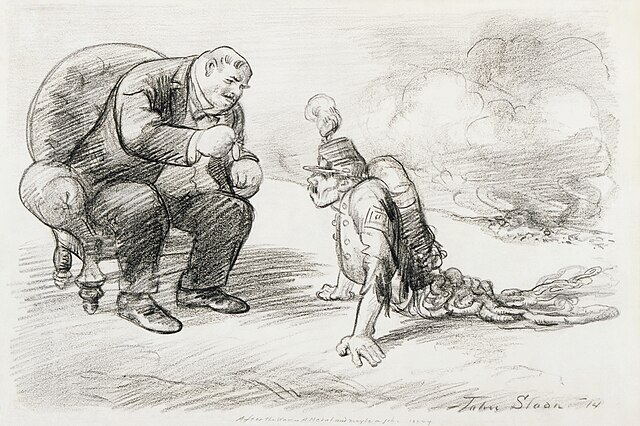On This Day in Rotten History...
In 1932 – (85 years ago) – Japanese aircraft began an unprovoked bombing of the Chinese city of Shanghai. Japan had invaded northern China a year earlier and established a puppet state there called Manchukuo, as a base from which it could attack the rest of China. Now it followed up its bombing of Shanghai with an attack on targets around the city by thousands of ground-based troops. The bombardments and fighting between Japanese and Chinese forces continued for several weeks until the League of Nations helped negotiate a cease-fire. Some thirteen thousand Chinese were killed, and about five thousand Japanese. Along with being one of the important precursors to World War II, the battle marked Japan’s establishment of the so-called “comfort women” system, which forced local women into sexual slavery to keep Japanese troops less inclined to revolt against their superiors.
In 1964 – (53 years ago) – an unarmed US Air Force T-39 carrying a flight instructor and two pilots took off from the US air base in Wiesbaden, West Germany, on what was called a routine training flight. Within an hour the airplane flew off course, over the so-called “Iron Curtain” into East German airspace, and the crew did not respond to the air controllers’ frantic calls. The plane was shot down by a Soviet jet fighter and all three crewmembers were killed. The incident sparked an ugly Cold War dispute. Soviet diplomat Giorgi Kornienko called the flight “a clear intrusion” and a “case of gross provocation.” Meanwhile, US Secretary of State Dean Rusk called the downing of the plane “a shocking and senseless act,” and Senator Hubert Humphrey called it “an act of brutality, force, and premeditated slaughter.” But US Senator Barry Goldwater, a former Air Force pilot and a Republican candidate for president, expressed skepticism. He told reporters: “It’s kind of hard to believe that all your navigational equipment would go out at once on that plane.”
In 1986 – (31 years ago) – at Cape Canaveral, Florida, engineers from aerospace contractor Morton Thiokol urged managers at NASA not to launch the space shuttle Challenger, warning that cold weather and ice conditions at the Cape would prevent key components of the launch vehicle from working safely. But the... read more
Listen live from 9AM - 1:00PM Central on WNUR 89.3FM / stream at www.thisishell.com / subscribe to the podcast
9:15 - Live from Kabul, journalist May Jeong reports Afghanistan's homegrown peace process.
May wrote the article The Patient War: What awaits Trump in Afghanistan in the February issue of Harper's.
10:00 - Civil rights lawyer Flint Taylor explains why the Chicago Police Department is reform-proof.
Flint's latest writing is Chicago's Brutal Example for Jacobin.
10:35 - Attorney Brian Foley draws the blueprints for a legal resistance to the Trump administration.
Brian is a lawyer practicing in Philadelphia, we'll also talk about his piece I Have A Scream for Counterpunch.
11:05 - Journalist Natasha Lennard makes the case for confrontation and disruption against the fascist threat.
Natasha wrote the recent pieces Neo-Nazi Richard Spencer Got Punched—You Can Thank the Black Bloc and Anti-Fascists Will Fight Trump’s Fascism in the Streets for The Nation.
12:05 - Editor Vyvian Raoul outlines strategies for reclaiming the public space from advertising's visual pollution.
Dog Section Press is releasing the book Advertising Shits In Your Head: Strategies for Resistance in February. You can read the first chapter here.
12:45 - In a Moment of Truth, Jeff Dorchen defines the Schlock Doctrine.
Hopefully this changes everything.
The Disposable People
Welcome to the Moment of Truth: the thirst that is the drink.
After the superwealthy have taken control of everything, what is going to happen to all the excess people? I mean, assuming the superwealthy continue on their current course of commandeering all the resources and phasing out human labor, what's going to happen to all the people they don't need? If those people begin to grow food for themselves, should they find somewhere to do so, won't the superwealthy eventually find out and take the arable land for their own profit? If they hunt and fish and gather, won't their land be taken away and turned into hunting, fishing, and gathering resorts for the superwealthy? And the pre-existing communities: if they aren't picturesque enough to bring in tourism dollars, and they can't farm and they can't get jobs and they can't hunt, fish or gather, how will they live?
I've heard estimates to the effect that 40% of the people on Earth at the moment are unnecessary to the people who matter: they're unemployable, they're in the way, and their misery isn't even necessary as a warning to the existing workforce not to ask for too much. 40% of humanity could be shed just like that. It's a wonder someone or some corporation or cabal of corporations hasn't taken care of this by now.
They're probably waiting to see how large the percentage can grow. It's entirely possible that the superwealthy could whittle the number of people necessary to keep them ecstatically comfortable down to, say, a few thousand per person who matters, or PWM. And better to massacre all of the expendables in one big lump than to do it piecemeal. Better from a PR standpoint. Then again, maybe they're actually doing it piecemeal as we speak.
But if so, they're doing it very slowly and in an extremely disorganized way. It's worth examining why they haven't taken more definitive, prompt action to eliminate the expendables.
It probably wouldn't be much fun to be a PWM without the ability to go to, say, a town on the Amalfi Coast, where people are living as you assume they've lived for a long time, for dinner on a pleasant piazza overlooking the Mediterranean where you are served a bowl of the most divine soup, and the jasmine petals fall from the trees into your soup, and you are meant to eat them, they compliment the soup deliciously. And you wander the narrow streets with your trophy spouse, passing picturesque... read more
On This Day in Rotten History...
In 1793 – (224 years ago) – King Louis XVI of France was led to a carriage and escorted by more than a thousand horsemen and armed citizens to the Place de la Revolution in Paris, where a huge crowd awaited him, along with a ragtag group of executioners. His failure to address his country’s economic crisis had sparked a revolution, and the new National Assembly had found him guilty of treason and stripped him of his crown and title. Upon reaching the scaffold, the ex-king loudly proclaimed his innocence to the crowd, and then was seized and shoved into the guillotine. Moments later, the heavy blade came down and separated his head from his body. One of the executioners, a young man of about eighteen, grabbed the severed head and held it high for the crowd to see. After a long moment of silence, a few people shouted: “Vive la Republique!” Others in the vast crowd picked up the phrase until it became a repetitive chant, growing louder and louder for more than ten minutes. Nine months later, Marie Antoinette, the ex-king’s wife, was beheaded in much the same way.
In 1941 – (76 years ago) – in Bucharest, Romania, a rebellion against the head of state, General Ion Antonescu, by Legionnaires of the Iron Guard, a right-wing Orthodox Christian paramilitary group, boiled over into an anti-Semitic pogrom. For the next two days, mobs of local people rampaged through the city’s predominantly Jewish neighborhoods, ransacking and burning down synagogues, businesses, and homes. Thousands of people from all walks of life were dragged into the streets, beaten, and tortured. Some were also slaughtered and mutilated, and still others were taken out of town and shot. By the time the bedlam died down, some 125 victims of the pogrom were dead.
In 1968 – (49 years ago) – near the US Air Force Base at Thule, Greenland, an American B-52 bomber carrying four hydrogen bombs experienced a cabin fire in flight. The whole crew was forced to bail out, one crew member being killed in the process. The burning airplane crashed onto the ice in nearby North Star Bay, not far from an indigenous Inuit settlement. The fiery crash ignited conventional detonators on the H-bombs, which in turn ruptured the bomb canisters and spread plutonium and other radioactive debris for miles. The subsequent cleanup operation by US and Danish personnel failed to... read more
Listen live from 9AM - 1:00PM Central on WNUR 89.3FM / stream at www.thisishell.com / subscribe to the podcast
9:15 - Journalist Kevin Gosztola reports on the politics of Chelsea Manning's new freedom.
Kevin wrote the recent article On Chelsea Manning's Freedom at Shadowproof. He has covered the Manning case since the very begining.
10:05 - CIP Americas Director Laura Carlsen views Trump's US-Mexico policy from the other side of a wall.
Laura just posted the article Bringing Mexico to Its Knees Will Not “Make America Great Again” at Counterpunch.
10:35 - Cultural critic Henry Giroux calls for militant hope and radical action in a time of collapse.
Henry is author of the essay Militant Hope in the Age of the Politics of the Disconnect for Counterpunch and War Culture, Militarism and Racist Violence Under Trump for Truthout.
11:10 - Writer Rebecca Liao surveys the space between Trump, China and capitalism's global elite.
Rebecca wrote the article Trumpism and the Davos Man for n+1.
12:05 - Black Agenda Report's Bruce Dixon lays out a new direction for the left, beyond hashtags.
Bruce Dixon wrote the recent articles Mocking, Marching, Stopping the Hate and Dumping Trump Are Not Enough and Is It Time To Revoke John Lewis’s Lifetime Civil Rights Hero Pass? for Black Agenda Report.
12:45 - In a Moment of Truth, Jeff Dorchen discusses disposable people.
Lousy Fascists
Welcome to the Moment of Truth: the thirst that is the drink.
Art critic and premature environmentalist John Ruskin said, "There is hardly anything in the world that some man cannot make a little worse and sell a little cheaper, and the people who consider price only are this man's lawful prey." Today, fascism is rising all over the world, and, as with everything these days but pharmaceuticals, the US response is to offer the product a little cheaper and a little worse. Where fascism is concerned, "made in the USA" is the new "made in China."
After WWI, so many great European artists – poets, painters, filmmakers, playwrights – were disgusted to their deepest core by the pointless death and destruction that had taken place. They gave voice to multitudes who felt the same. But some pricks weren't satisfied. Germany was impoverished by bad treaty terms, no doubt, and the victors in Europe weren't treating the losers too well, but these unrepentant pricks would have felt the same way regardless. The poverty and embarrassment of nations was just an opportunity to them.
Today we call these pricks fascists, whether they adopted the name and the shirt or not. Franco, Hitler, and Mussolini were fascists. Stalin was an opportunist of similar stripe, and though for chronological, geographical and picayune decorative reasons we don't call him a fascist, he was a fascist, as were Mao and Jiang Qing and Chiang- kai Shek and Hirohito. And they had some fascist game. They were good at their jobs. Stalin alone murdered the equivalent of the entire population of greater Los Angeles and then some.
WWII was made by fascists. Even in the aftermath of a war most people judged an abhorrent, meaningless paroxysm of carnage, fascists wanted another war and got it. They didn't just talk the talk.
It took a pile of 40 million more corpses to feed the beast birthed by fascism, and so awful was it that even the leftover fascists and newly-aspiring fascists couldn't buck the anti-fascist, anti-war, anti-hatred trend that followed in its wake for a good thirty-five years. No, it took a lot of doing, a lot of lying, and a lot of killing before labor union victories and democratic socialism and investment in the public welfare could be turned into the perceived profanities they're treated as today, particularly in the United States.
It was pretty rough going for fascists for a while here in the USA.... read more
On This Day in Rotten History...
In 1761 – (256 years ago) – in one of the most significant armed conflicts of the eighteenth century, forces of the Maratha empire met Afghan invaders in battle near Paripat, in what is now northern India. The Marathas were at the peak of their power, and they came to the fight with brand-new French-built artillery. But after heavy bloodshed they were pushed back by the more numerous and better trained Afghans in a battle that is viewed today as having marked the beginning of the Maratha empire’s decline. Between thirty and forty thousand Maratha warriors were killed, as were some twenty to forty thousand Afghans. And on the next day the Afghans overrran the city of Paripat, massacring some forty to seventy thousand noncombatants. But the Afghans would fail to follow up on their victory, and were soon pushed out of India by the Sikhs. One historian has written that the battle at Paripat “did not decide who was to rule India, but rather who was not. The way was, therefore, cleared for the rise of the British power in India.”
In 1907 – (110 years ago) – the city of Kingston, Jamaica, was struck by an estimated magnitude 6.5 earthquake. It was seen as one of the deadliest earthquakes recorded up to that time. All buildings in Kingston were damaged, with about 85 percent of them completely destroyed. The initial quake was followed by fires, a tsunami, and some eighty aftershocks over the next several weeks. All in all, about eight hundred to one thousand people were killed, and another ten thousand were left homeless.
In 1966 – (51 years ago) – Sergei Korolev, chief designer of the Soviet Union’s space program, died from a bungled surgical operation. Korolev, a rocket scientist whom Stalin had exiled to Siberia, had later been recalled to design and build military missiles. After Nikita Khrushschev came to power, Korolev shrewdly diverted resources toward space exploration, leading the projects to launch Sputnik into orbit in 1957, and Yuri Gagarin in 1961. Through the early Sixties he labored to satisfy Khrushchev’s constant demands for Cold War propaganda victories over the United States, by masterminding a series of politically driven space spectaculars, including the first spaceflight by a woman, and the first spacewalk. But in 1966 he underwent routine surgery for hemorrhoids, performed personally by the... read more






